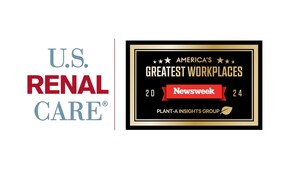PLANO, Texas, May 7, 2024 /PRNewswire/ -- U.S. Renal Care (USRC), the largest privately-held kidney care provider in the United States, has released a short film highlighting the positive impact of vascular access education for people undergoing hemodialysis, and the power of strong caregiver relationships with patients.
The film features Bonnie Coffaro, a USRC patient in South Tampa, Florida, and her dialysis clinic social worker, Larissa Kisner, LCSW. Larissa provided Bonnie with education around her dialysis access options and support as Bonnie determined the optimal dialysis access for her.
Each patient receiving hemodialysis for kidney failure must have an access placed to allow blood to be cleaned by the dialysis machine and remove excess fluid from the body. Access options for hemodialysis patients include arteriovenous (AV) fistulas, AV grafts, and central venous catheters (CVC). Each has its own set of advantages and disadvantages.
After working with Larissa to understand all access options available to her, Bonnie made the decision to transition from a CVC to an AV fistula. CVCs can be placed at various points in the body, but most often are placed in the upper chest where they go underneath a patient's skin into a large blood vessel and then sit directly above the heart. Because of this, the risk of infection is high, making CVCs the highest risk long-term access option for dialysis patients. AV fistulas and AV grafts, on the other hand, are surgical connections made between an artery and a vein to allow sufficient blood flow in the vein for safer and more efficient hemodialysis treatments.
In the film, Bonnie shares her satisfaction with her decision, the benefits she experienced, and her gratitude for the relationship with Larissa and the USRC clinic staff.
"[The fistula is] much more comfortable and you're going to have a chance to go out and do the things you could not do when you have a catheter in your neck," said Bonnie. "I feel like the U.S. Renal [Care] staff is part of my family."
USRC has made helping patients find their optimal access a top priority across their centers. USRC Chief Medical Officer Mary Dittrich, MD, FASN, underscored the priority for USRC staff to help patients understand their access options and transition to the right access option for them, ensuring optimal health outcomes.
"Fistulas are the gold standard for optimal hemodialysis access," said Dr. Dittrich. "Fistulas and grafts have a lower risk of clotting and infection and can last for years, whereas catheters carry a much greater risk of infection, hospitalization and death."
Bonnie's story illustrates the improved quality of life that she has experienced since her transition to a fistula.
"I'm very proud of her," said Larissa. "The evolution of someone making that decision to go from a catheter into an access looks different for every patient. With Bonnie, it's more about providing her with the information and allowing her to make the choices because she wants to make sure she's getting the best care and the best treatment."
About U.S. Renal Care
U.S. Renal Care partners with nephrologists across 33 states in the U.S. to care for more than 36,000 people living with kidney disease. Since 2000, U.S. Renal Care has been a leader in clinical quality, innovation, and operational excellence – delivering the best experience and outcomes for our patients. To learn more about U.S. Renal Care, visit our website usrenalcare.com.
SOURCE U.S. Renal Care

WANT YOUR COMPANY'S NEWS FEATURED ON PRNEWSWIRE.COM?
Newsrooms &
Influencers
Digital Media
Outlets
Journalists
Opted In







Share this article